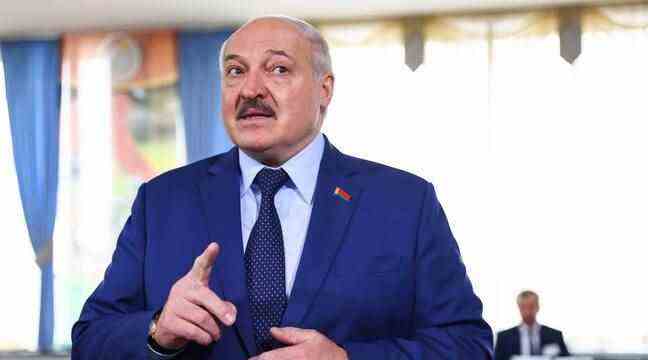As Russia continues its invasion of UkraineBelarus seems to be in danger of gradually losing its sovereignty to the benefit of its powerful neighbour, due to the weakening of its President Alexander Lukashenko vis-à-vis Vladimir Poutine. The Belarusian head of state is already criticized for having authorized the presence on his territory of Russian troops a few weeks before they invaded Ukraine: some 30,000 soldiers from Moscowwho officially participated in exercises, thus found themselves 200 kilometers from the Ukrainian capital Kiev.
At the head for nearly 30 years of a country that he rules with an iron fist, Alexander Lukashenko also decided to hold a constitutional referendum on Sunday, described as illegitimate by the opposition and considered as an attempt to further prolong his stay in power. Amendments to the Basic Law proposed by the regime prove particularly problematic for national sovereignty: they include a modification of the post-Soviet status of neutrality of the Belaruswhich would allow the country to permanently host nuclear weapons and Russian forces.
No annexation in sight, but a satellite status
The Belarusians “deserve better” than to become the “vassals” of Russia, launched Friday the French Minister of Foreign Affairs, Jean-Yves Le Drian, following a meeting with Belarusian opposition leader Svetlana Tikhanovskaïa in Paris. “The complicity of the regime of Alexander Lukashenko in the invasion of Ukraine by Russia, in the most total disregard of international law and the agreements signed, marks a new and very serious stage in the process of submitting Mr Lukashenko to Russia,” he said.
The annexation of Belarus is not Moscow’s preferred option because it “would provoke discontent and resistance from the population”, she explains. But with Russian tanks in the country, if Lukashenko remains “the face of the regime, the real power lies elsewhere,” said Olga Dryndova, from the Research Center for East European Studies at the University of Bremen. Alexander Lukashenko had thus been supported by the Kremlin after the August 2020 elections, where massive fraud was denounced by the opposition. More than 1,000 protesters are still languishing in prison, according to the opposition.
“He may think that when the Kremlin no longer needs him, he can get rid of him”
Svetlana Tikhanovskaïa who, according to the West, had won these elections, now lives in exile. In an interview with AFP this week, she said Lukashenko was ready to sacrifice the country’s sovereignty because he was “grateful” for the Kremlin’s support in the aftermath of the 2020 election. “We want to be friends with our neighbours, but we don’t want to be the appendage of another country”, she also said during her visit to Paris.
Alexander Lukashenko, once accused by the United States of leading the last dictatorship of Europe, has long projected the image of a maverick, often appearing in uniform and peppering his comments with down-to-earth and sometimes vulgar expressions. But this verve masks a great weakness, the presence of Russian troops representing a threat to its own power. “He can also think that one day, when the Kremlin no longer needs him, he can get rid of him,” commented Svetlana Tikhanovskaïa.
According to Olga Dryndova, it is likely that the Belarusian authorities did not initially imagine that Russian soldiers would stay so long and use the country as a launching pad against Ukraine. “I don’t have the impression that Lukashenko was in favor of this option, she says. But he is no longer strong enough to say no to Putin. »

